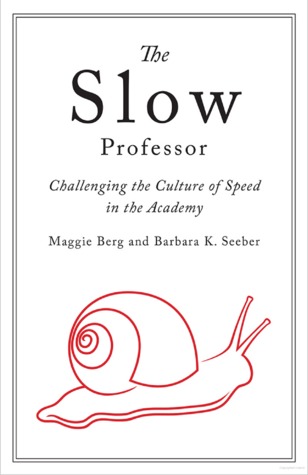Like this article? rabble is reader-supported journalism. Chip in to keep stories like these coming.
Symbols of the neoliberal university in Canada are so common these days it’s hard not to feel inured to them sometimes. Stories of $1 million signs going up next to mouldering arts buildings, ballooning administrator pay contrasted with poverty wages for sessional faculty, and two-tier toilet paper systems circulate often in the mainstream press and around certain dinner tables.
This has also given rise, in the past few years, to a burgeoning subfield of literature that attempts to explain the precise state of crisis that we find ourselves in.
As a doctoral student in the humanities, I am all too familiar with the corporatized university’s problems, as well as with proposed solutions that sometimes feel as attainable as home ownership for millenials in Vancouver. This is why I approached Maggie Berg and Barbara Seeber’s new book, The Slow Professor: Challenging the Culture of Speed in the Academy, somewhat warily.
The Slow Professor is Berg and Seeber’s addition to anti-Corporate U lit, but these authors, who are both tenured professors at Ontario universities, have taken a slightly different track.
Berg and Seeber believe that most responses to the neoliberal university are couched in the language of urgency and crisis, with arguments that something must be done now (or yesterday) to save our country’s institutions of higher learning from imminent peril.
However, these responses only feed in to the culture of speed that the modern university thrives on. Therefore, Berg and Seeber decided to apply the principles of the Slow Food movement to the academy to suggest ways of “taking time for reflection and dialogue.”
In this way, they write, “the Slow Professor takes back the intellectual life of the university.”
While the principles of the Slow Food movement have been applied to several different areas, from architecture to sex, Berg and Seeber write that it “has not yet found its way into education.”
Although this is not entirely true — the feminist academic blog Hook and Eye has been discussing the idea of the slow academy for several years — this is the first book to think about these ideas in a systematic way, and offer concrete advice for how faculty and graduate students can apply these principles to their professional lives.
Berg and Seeber are unabashedly optimistic about the change they think individuals in the academy can create. While this focus on individualism does somewhat undercut the real gains that unions and other forms of collective action can make for workers in the academy, the individual acts Berg and Seeber suggest do have the potential to make changes at the level of academic culture — shifts that are perhaps less tangible for annual reports, but no less impactful.
These include turning the way from the culture of “publish or perish,” fostering “holding environments” for your colleagues, and thinking about how relationships are central to learning.
The fact that Berg and Seeber write from a position of job security that is becoming ever more rare in the academy has already earned their book a sneering dismissal from blogger and sessional instructor Andrew Robinson, who called it a “grotesque example of tenured faculty privilege.“
I don’t agree with this assessment.
The fact that precarious labour is becoming the norm in the academy impacts everyone, including those with tenure. The fact that sessional professors work extremely hard for meagre compensation doesn’t discount the stress that securely-employed faculty experience in their jobs.
Also, there are some parts of the book that can apply to anyone in the academy. The chapter on “Pedagogy and Pleasure” includes mindfulness techniques to help one approach teaching from a grounded, empathetic place. “Time Management and Timelessness” dismisses unrealistic advice proffered by time-management gurus and stresses the importance of setting aside time for deep thinking and intellectual play.
Where I think The Slow Professor does falls short is in addressing how people working within the corporatized university experience its effects differently depending on the nature of their work.
Yes, tenured faculty are stressed out, but they are also enormously privileged in comparison to sessional lecturers and graduate students. Berg and Seeber acknowledge that that “contingent labour is ever on the rise,” but they don’t really engage with this phenomenon in a substantive way.
As such, they miss a real opportunity in this book to think about how individuals can undercut the corporate university by bringing more people into the circle. Tenured faculty have a responsibility to use their institutional privilege to help make the university a more equitable place. This, to my mind, is not at odds with the kinds of individual actions that Berg and Seeber envision the Slow Professor performing.
For example, in “Collegiality and Community” — why not make an effort to get to know sessional lecturers in your department and make sure they’re in the loop about department events? Why not break the culture of silence around mental health by having frank conversations with your graduate students about your own struggles?
These are only two ways Berg and Seeber could have engaged more substantively with the problems of the corporate university without reverting to the language of crisis and speed.
While The Slow Professor is a thought-provoking take on how to combat neoliberal policies as they play out in our institutions, it misses the mark in thinking about the ways individual acts of slowness can spiral outwards to make for a more just system for all.
This one major drawback means that the book — and some of its very good advice — risks turning into a mouthpiece for a few of the university’s most privileged members to continue talking only to each other.
Christina Turner is doctoral student in the department of English at the University of Toronto. She was rabble’s books and blogs intern from 2013-2014.



